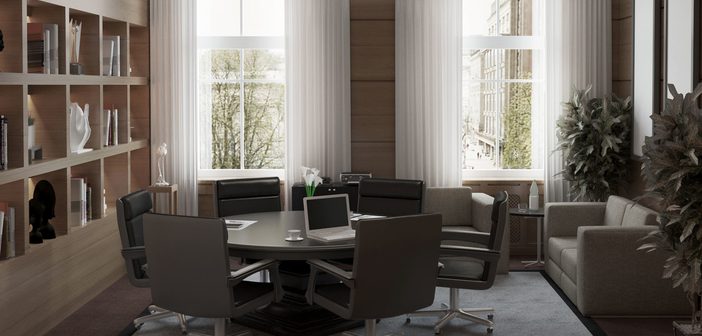by Andrew Jones
Few things in the hospitality world are as sad as the average hotel ‘business center.’ A small and lonely room down the hall with a desktop computer, a printer, and a jar of pens exists more or less for … printing boarding passes. As more and more people (especially business travelers) download their boarding passes on their phones, it would seem that the business center will only get smaller and sadder over time.
Gen One
But what to do? Is there a new way to envision the ‘business end’ of the hotel experience? This is but one window where coworking entrepreneurs see opportunities within the context of the hotel industry. The inclusion of coworking, or at least coworking-like spaces, is not necessarily new in the hotel industry, but neither is it common. One of the oldest ventures in the space, Workspring by Marriott (now M Space), was a partnership between Steelcase, which created the Workspring brand in Chicago, and Marriott. Their Redmond, WA, location aimed to be a new kind of smartly designed and hospitality-forward hotel meeting venue.
Both locations have recently closed. Steelcase decided to remain a furniture manufacturer and has gotten out of the hospitality business altogether.
The Boutique Gen
However, for a number of new boutique hotels, the incorporation of coworking is becoming a thing. Some of these, such as The Curtain (in London), and Eaton Workshop (DC and Hong Kong) are combining elements of a social club with a hotel with coworking and meeting rooms. The broader social contexts being created in these ventures seem to make coworking a natural fit. These offerings also are as premium as they are unique.
The hotel + coworking concept also is taking root with the younger traveler seeking a more Airbnb kind of experience. Selina is a hostel-like network of hotels throughout Central and South America that includes coworking spaces. They are focused specifically on digital nomads who like to travel and explore as they work on projects remotely. Also focused on the digital nomad is the brand Kafnu, which is a network of hotels with coworking across Asia. Largely designed as work clubs, locations offer varying sizes of mini-hotels with 15-20 rooms. More upscale than Selina, this brand’s target demographic is similarly an Airbnb-type user. Selina and Kafnu share a focus on community and entrepreneurship and aim to bring these two things together in their hotel experience.
Another twist on hotel coworking is the Ace Hotel in New York City. The Ace has famously turned its large lobby into an open-to-the-public (and free) coworking space. Many of the people who gather there during the day are locals, who use it as a regular workplace. In this respect, it has become a true community hub. When the lights come down in the evening, the space switches over to drinks and socializing, and further establishes the Ace lobby as a community space.
Hotel Schani in Vienna also combines a boutique hotel with membership-based coworking, creating a hybrid similar to the Ace. However, the coworking memberships (available to the local public) are not free. This creates a similar mash-up as the Ace, but the business model is different. These two examples are instructive for business model purposes.

PETINOV SERGEY MIHILOVICH/SHUTTERSTOCK.COM
Ways Forward
Each of these examples falls into an emergent category of boutique hotels that are actively experimenting on the social/community side of the hospitality equation. More conventional hotels, such as Marriott with its now-defunct experiment with Workspring, have been less successful at bringing coworking into the fold. Perhaps the business models of the large hotels simply don’t allow for it, or perhaps there simply isn’t enough square footage in costly floor plates to experiment.
It also might be that mainstream travelers are less interested in the social experiences being put together by the boutique hotels discussed here. For those of us in the coworking industry, there is little doubt that we can – and likely will – deliver better “business centers” and meeting/conference room experiences in the future. The tricky question is how will hotels incorporate elements of coworking in ways that enhance their business models?
Coworking Space:
- Will coworking spaces be an amenity to guests only, where they have free access to work stations?
- Will it be open and free to the public for community-building purposes like at the Ace?
- Will it be open to the public but at a cost, like Hotel Schani?
- Can access to workspace be integrated into hotel loyalty programs?
- How will a coworking area and lounge/lobby area compete for space?
- How might an outside local coffee shop operating in the space bring in an authentic community element to activate the hotel?
Meeting Space:
- Hotel meeting venues, while not as depressing as business centers, could use a generational update. But what will that look like?
- Could a hospitality-forward coworking operator step in and elevate the meeting room offering/experience for a partner hotel?
- How would the business model work?
- Would the possible increase in traffic, likability, and RPAR offset the possible loss of meeting-room revenue?
- How would catering be handled, etc?
At the end of the day, the business model will have to work for the primary host (i.e., the hotel), as well as for the coworking partner. Perhaps, in time, one of the hotel chains will create its own internal brand of coworking space and set a new direction. I envision a decade of experimentation ahead, where elements of coworking and hybrid approaches are tested. Winning models likely will emerge in the process. Hopefully, by then, we can agree to retire the ‘business center’ to an exhibit in the Hotel Industry Museum, with a sign overhead reading: Print Your Boarding Pass Here.
 Andrew Jones, PhD, is a cofounder of OpenWork Agency, one of the world’s leading coworking consultancies. He is a former business school professor and is the author of three books on corporate innovation, design thinking, and coworking.
Andrew Jones, PhD, is a cofounder of OpenWork Agency, one of the world’s leading coworking consultancies. He is a former business school professor and is the author of three books on corporate innovation, design thinking, and coworking.




